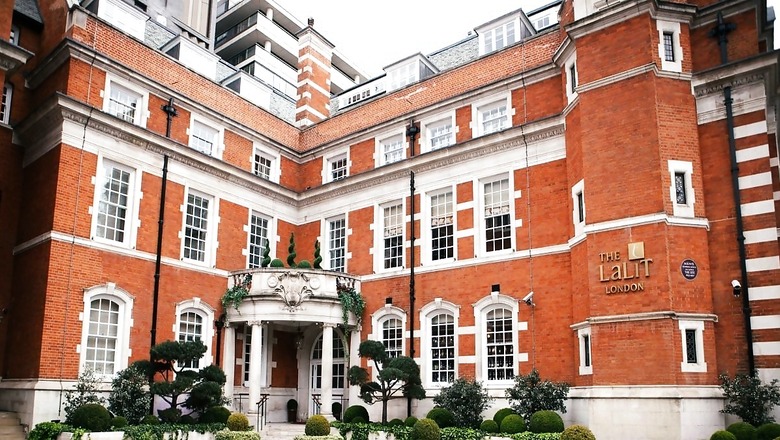
views
Reports say that Russian luxury hotels, previously associated with renowned brands like the Ritz and Four Seasons, are now seeking Indian expertise to manage their properties. This shift signifies a paradigm change in the global hospitality landscape, and India’s growing influence is undeniable. With a thriving domestic industry steadily recovering post-pandemic and world-class educational institutions nurturing future hospitality leaders, India’s global footprint in the hospitality sector is not simply a trend, but a certainty.
From humble beginnings to setting the global standard, India’s hospitality industry is experiencing a remarkable transformation. Once primarily catering to domestic travellers, Indian hotel brands are now making their mark on the international stage. From IHCL’s strategic expansion with luxurious properties like the Taj Exotica Resort & Spa in the Maldives to The Lalit’s foray into the prestigious London market, Indian hospitality is proving its ability to match and surpass international standards.
India’s hospitality industry is experiencing robust growth, currently valued at an estimated $24.61 billion in 2024. This figure is projected to reach $31.01 billion by 2029, reflecting a compound annual growth rate (CAGR) of 4.73 per cent [Mordor Intelligence: Hospitality Industry In India Market Size]. This indicates a consistent upward trajectory and a promising future for the sector.
While the pandemic impacted the industry significantly, it’s currently witnessing a positive recovery. Occupancy rates are steadily climbing, with a recent report by STR (formerly Smith Travel Research) indicating a national average occupancy rate of 65 per cent in December 2023, exceeding pre-pandemic levels. Tourist arrivals are also on the rise, with the Ministry of Tourism reporting a 20 per cent year-on-year increase in foreign tourist arrivals in the first half of 2024. These indicators paint a picture of a resilient and resurgent domestic hospitality industry.
The success story of Indian hospitality extends far beyond its domestic market. Renowned brands are actively embarking on a journey of international expansion, propelled by a vision to establish their presence on the global stage. Leading the charge is IHCL (formerly The Indian Hotels Company Limited), boasting an impressive international portfolio spread across five continents and 12 countries. Their luxurious properties, like the Taj Exotica Resort & Spa in the Maldives, showcase their commitment to delivering exceptional experiences to a global clientele.
Following suit is The Lalit, who made a remarkable foray into the prestigious London market with their five-star hotel in 2017. This strategic move not only signifies their ambition but also reflects the growing confidence and international appeal of Indian hospitality brands.
Furthermore, the aspirations extend beyond established players. Emerging brands like Lemon Tree Hotels and the Sarovar group have expressed their interest in managing properties outside India, demonstrating a collective ambition to carve a niche in the international hospitality landscape. This multi-pronged approach, encompassing established giants, rising stars, and management expertise, paints a compelling picture of India’s growing influence in the global hospitality industry.
Continuing the narrative of India’s growing global presence in hospitality, a fascinating development is unfolding in Russia. According to an exclusive report by Mint, top luxury hotels, once managed by esteemed international brands like Ritz-Carlton, Four Seasons, and Park Hyatt, are now exploring partnerships with leading Indian hospitality firms. This shift follows the departure of Western brands in the wake of the Ukraine conflict.
Reports suggest that Russian officials have initiated talks with the Tata Group’s Indian Hotels Co. Ltd. (IHCL) and East India Hotels (EIH), the respective operators of the prestigious Taj and Oberoi chains. This interest stems from the gap created by the exodus of major Western hotel chains, leaving a void in branding, global distribution systems, and on-site management expertise for these luxury properties in Moscow and St. Petersburg. Additionally, several new luxury hotels under construction require branding and distribution solutions.
Beyond the established players, industry reports say that executives from Sarovar Hotels & Resorts, known for operating Louvre Hotels in India, have also engaged in discussions and evaluations of certain properties in Russia. This further underscores the broad spectrum of Indian hospitality companies actively exploring opportunities in the international market. This development aligns perfectly with the narrative of India’s expanding influence in the global hospitality industry. With their proven expertise and growing international appeal, Indian players stand poised to potentially fill the void left by Western brands in Russia, further solidifying their position as major players on the global stage.
But it’s not just hotels…
Further solidifying the potential for collaboration, Russia has made significant strides in attracting Indian tourists. This strategic focus comes in response to a 25 per cent surge in Indian visitors to Moscow in 2023, highlighting India’s growing importance as a source market.
Russia’s efforts include:
Simplified visa procedures: The introduction of a faster and cheaper electronic visa program has made visiting Russia more accessible for Indian travellers.
Targeted marketing initiatives: Moscow city representatives are actively engaging with Indian online travel platforms to promote tourism opportunities.
Enhanced infrastructure: Investments have been made to improve infrastructure for international visitors, including bilingual signage and public transport announcements. Hotels are also adapting to cater to diverse needs.
Officials acknowledge the potential: Bulat Nurmukhanov, Head of International Cooperation Division of Moscow City Tourism Committee, stated their commitment to “reviving the influx of Indian tourists to Moscow to reach pre-Covid levels.”
The initiatives appear to be yielding positive results, as evidenced by the increasing number of Indian tourists visiting Russia. However, the efforts extend beyond attracting visitors. Moscow is also exploring potential partnerships with Indian trade entities, suggesting a multi-pronged approach to strengthening ties with the Indian market.
Challenges and Opportunities
While the global travel and tourism industry is poised for growth, Indian hospitality brands face challenges like:
- Competition: Established global brands require differentiation.
- Cultural adaptation: Tailoring offerings to diverse preferences is crucial.
- Talent acquisition and brand building: Attracting and retaining skilled personnel and building a strong brand identity is essential.
Despite these challenges, numerous opportunities exist:
- The growing global market: This creates fertile ground for expansion.
- India’s unique selling points: Rich heritage and cultural experiences can be powerful tools.
- Technological innovation: Embracing technology offers a competitive edge.
Government Support
The Indian government’s ‘Incredible India’ campaign exemplifies governmental support for promoting Indian tourism globally. This initiative, along with infrastructure development projects, helps create a conducive environment for the industry to flourish.
Despite the challenges, the future of Indian hospitality on the global stage looks promising. The growing global travel market and India’s unique selling points present significant opportunities for expansion. By addressing challenges like cultural adaptation, talent acquisition, and brand building, while leveraging technological advancements and government support, Indian hospitality brands can solidify their position as key players in the international market.
Moreover, their proactive measures, as shown by the examples of IHCL, The Oberoi Group, The Lalit Group, and Taj Hotels, demonstrate their commitment to navigating the complexities of the global landscape and establishing their international presence. The journey will undoubtedly be challenging, but with continued focus on innovation, adaptation, and quality, Indian hospitality has the potential to become a force to be reckoned with in the global market.
As Indian hospitality continues its global expansion, keep an eye out for exciting new properties and experiences emerging around the world, spreading the world-renowned hospitality of India through the message of Atithi Devo Bhava.
Views expressed in the above piece are personal and solely those of the author. They do not necessarily reflect News18’s views.



















Comments
0 comment